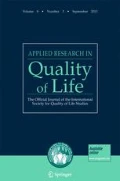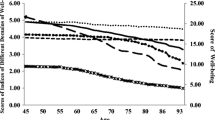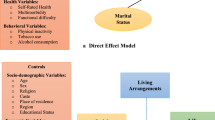Abstract
Previous research has illustrated that lifestyle is correlated with widowhood and subjective well-being amongst older people; however, few studies have examined the mediating effects of lifestyle behaviors on the relationship between widowhood and subjective well-being. As China has a large number of widowed older people, we sought to examine which lifestyle behaviors are associated with better (or worse) subjective well-being amongst widows. Using data from the 2013 Chinese General Social Survey (CGSS), this study uses ordered logit model (OLM), propensity score matching, and mediation analyses to explore the relationship between widowhood and subjective well-being, particularly the mediating effects of the three lifestyle dimensions: recreational involvement frequency, media use frequency, and interaction frequency with relatives and friends. We found that the lifestyles of widowed older adults differed from those with spouses: the frequency of leisure time and frequency of media use by widowed older adults were lower than those with spouses. Widowhood demonstrated a significant negative correlation with the subjective well-being of older adults. The frequency of leisure time activity had a partial mediating effect between widowhood and subjective well-being. Our results reveal a direct positive relationship between the frequency of leisure time and subjective well-being amongst widowed older adults. These findings have important implications for improving the experience of widowhood through lifestyle interventions.


Similar content being viewed by others
References
Baron, R. M., & Kenny, D. A. (1986). The moderator-mediator variable distinction in social psychological research: Conceptual, strategic, and statistical considerations. Journal of Personality and Social Psychology, 51(6), 1173–1182.
Bennett, K. M., & Soulsby, L. K. (2012). Wellbeing in bereavement and widowhood. Illness, Crisis & Loss, 20(4), 321–337.
Boniel-Nissim, M., Tabak, I., Mazur, J., Borraccino, A., Brooks, F., Gommans, R., et al. (2015). Supportive communication with parents moderates the negative effects of electronic media use on life satisfaction during adolescence. International Journal of Public Health, 60(2), 189–198.
Brajša-Žganec, A., Merkaš, M., & Šverko, I. (2011). Quality of life and leisure activities: How do leisure activities contribute to subjective well-being? Social Indicators Research, 102(1), 81–91.
Carr, D., & Utz, R. (2001). Late-life widowhood in the United States: New directions in research and theory. Ageing International, 27(1), 65–88.
Diener, E. (2012). New findings and future directions for subjective well-being research. American Psychologist, 67(8), 590–597.
Diener, E., Suh, E. M., Lucas, R. E., & Smith, H. L. (1999). Subjective well-being: Three decades of progress. Psychological Bulletin, 125(2), 276–302.
Duncan, G. J., Wilkerson, B., & England, P. (2006). Cleaning up their act: The effects of marriage and cohabitation on licit and illicit drug use. Demography, 43(4), 691–710.
Dykstra, P. A. (1995). Loneliness among the never and formerly married: The importance of supportive friendships and a desire for independence. The Journals of Gerontology Series B: Psychological Sciences and Social Sciences, 50(5), S321–S329.
Fried, E. I., Bockting, C., Arjadi, R., Borsboom, D., Amshoff, M., Cramer, A. O. J., et al. (2015). From loss to loneliness: The relationship between bereavement and depressive symptoms. Journal of Abnormal Psychology, 124(2), 256–265.
Fujita, F., & Diener, E. (2005). Life satisfaction set point: Stability and change. Journal of Personality and Social Psychology, 88(1), 158–164.
Gross, E. F., Juvonen, J., & Gable, S. L. (2002). Internet use and well-being in adolescence. Journal of Social Issues, 58(1), 75–90.
Hagedoorn, M., Van Yperen, N. W., Coyne, J. C., van Jaarsveld, C. H., Ranchor, A. V., van Sonderen, E., & Sanderman, R. (2006). Does marriage protect older people from distress? The role of equity and recency of bereavement. Psychology and Aging, 21(3), 611–620.
Hahn, E. A., Cichy, K. E., Small, B. J., & Almeida, D. M. (2013). Daily emotional and physical reactivity to stressors among widowed and married older adults. The Journals of Gerontology Series B: Psychological Sciences and Social Sciences, 69(1), 19–28.
Hershberger, P. J., & Walsh, W. B. (1990). Multiple role involvements and the adjustment to conjugal bereavement: An exploratory study. OMEGA - Journal of Death and Dying, 21(2), 91–102.
Ho, S.-H., & Hung, W.-S. (2013). The impacts of widowhood, chronic disease, and physical function on mortality among older people. Journal of Nursing Research, 21(2), 110–119.
Huang, H., & Humphreys, B. R. (2012). Sports participation and happiness: Evidence from US microdata. Journal of Economic Psychology, 33(4), 776–793.
Huang, J.-P., & Yin, Q.-J. (2013). The effects of socioeconomic status on health: Based on lifestyle mediator. Population & Economics, 33(3), 26–34.
Kavanaugh, A. L., Reese, D. D., Carroll, J. M., & Rosson, M. B. (2005). Weak ties in networked communities. The Information Society, 21(2), 119–131.
Lennartsson, C., & Silverstein, M. (2001). Does engagement with life enhance survival of elderly people in Sweden? The role of social and leisure activities. The Journals of Gerontology Series B: Psychological Sciences and Social Sciences, 56(6), S335–S342.
Li, C. S., Lee, J. H., Chang, L. Y., Liu, C. C., Chan, Y. L., Wen, C., et al. (2016). Physical activity to overcome the adversity of widowhood: Benefits beyond physical health. Medicine, 95(32).
Lucas, R. E. (2007). Adaptation and the set-point model of subjective well-being: Does happiness change after major life events? Current Directions in Psychological Science, 16(2), 75–79.
Ong, A. D., Fuller-Rowell, T. E., & Bonanno, G. A. (2010). Prospective predictors of positive emotions following spousal loss. Psychology and Aging, 25(3), 653–660.
Oshio, T. (2012). Gender differences in the associations of life satisfaction with family and social relations among the Japanese elderly. Journal of Cross-Cultural Gerontology, 27(3), 259–274.
PCO. (2012). Tabulation on the 2010 population census of the people’s republic of China. Beijing: China Statistics Press.
Perrig-Chiello, P., Spahni, S., Höpflinger, F., & Carr, D. (2015). Cohort and gender differences in psychosocial adjustment to later-life widowhood. The Journals of Gerontology Series B: Psychological Sciences and Social Sciences, 71(4), 765–774.
Pinquart, M., & Sorensen, S. (2001). Gender differences in self-concept and psychological well-being in old age: A meta-analysis. The Journals of Gerontology Series B: Psychological Sciences and Social Sciences, 56(4), P195–P213.
Preacher, K. J., & Hayes, A. F. (2004). Spss and sas procedures for estimating indirect effects in simple mediation models. Behavior Research Methods, Instruments, & Computers, 36(4), 717–731.
Sasson, I., & Umberson, D. J. (2014). Widowhood and depression: New light on gender differences, selection, and psychological adjustment. The Journals of Gerontology Series B: Psychological Sciences and Social Sciences, 69(1), 135–145.
Scannell-Desch, E. (2003). Women's adjustment to widowhood. Theory, research, and interventions. Journal of Psychosocial Nursing and Mental Health Services, 41(5), 28–36.
Sheldon, K. M., & Lyubomirsky, S. (2012). The challenge of staying happier: Testing the hedonic adaptation prevention model. Personality and Social Psychology Bulletin, 38(5), 670–680.
Somhlaba, N. Z., & Wait, J. W. (2008). Psychological adjustment to conjugal bereavement: Do social networks aid coping following spousal death? Journal of Death and Dying, 57(4), 341–366.
Stahl, S. T., & Schulz, R. (2014). The effect of widowhood on husbands’ and wives’ physical activity: The cardiovascular health study. Journal of Behavioral Medicine, 37(4), 806–817.
Strain, L. A., Grabusic, C. C., Searle, M. S., & Dunn, N. J. (2002). Continuing and ceasing leisure activities in later life: A longitudinal study. The Gerontologist, 42(2), 217–223.
Sun, S., Chen, J., Johannesson, M., Kind, P., & Burström, K. (2016). Subjective well-being and its association with subjective health status, age, sex, region, and socio-economic characteristics in a Chinese population study. Journal of Happiness Studies, 17(2), 833–873.
Tiedt, A. D., Saito, Y., & Crimmins, E. M. (2016). Depressive symptoms, transitions to widowhood, and informal support from adult children among older women and men in Japan. Research on Aging, 38(6), 619–642.
Uglanova, E. A., & Staudinger, U. M. (2013). Zooming in on life events: Is hedonic adaptation sensitive to the temporal distance from the event? Social Indicators Research, 111(1), 265–286.
United Nations. (2015). World population prospects: The 2015 revision, world population 2015 wallchart. ST/ESA/SER.A/378. New York: United Nations.
Utz, R. L., Carr, D., Nesse, R., & Wortman, C. B. (2002). The effect of widowhood on older adults' social participation: An evaluation of activity, disengagement, and continuity theories. The Gerontologist, 42(4), 522–533.
Utz, R. L., Swenson, K. L., Caserta, M., Lund, D., & Devries, B. (2014). Feeling lonely versus being alone: Loneliness and social support among recently bereaved persons. The Journals of Gerontology Series B: Psychological Sciences and Social Sciences, 69(1), 85–94.
Wade, J. B., Hart, R. P., Wade, J. H., Bekenstein, J., Ham, C., & Bajaj, J. S. (2016). Does the death of a spouse increase subjective well-being: An assessment in a population of adults with neurological illness. Healthy Aging Research, 5(2), 1–9.
Wang, G., & Ge, H. (2013). Status of widowed elderly population in China and its development trend. Science Research Aging, 1(1), 44–55.
Wei, L. (2010). Can media make us happy--literature review of the relation between media and subjunctive well-being. The Journal of Communication, 32(4), 16–18.
Wheatley, D., & Bickerton, C. (2017). Subjective well-being and engagement in arts, culture and sport. Journal of Cultural Economics, 41(1), 23–45.
Wilder, S. E. (2016). Communication practices and advice in later-life widowhood: “We just talked about what it is like to not have your buddy”. Communication Studies, 67(1), 111–126.
Wu, Z., & Hart, R. (2002). The effects of marital and nonmarital union transition on health. Journal of Marriage and Family, 64(2), 420–432.
Author information
Authors and Affiliations
Corresponding author
Ethics declarations
Competing Interests
The authors declare that they have no competing interest.
Ethical Statement
CGSS (the Chinese General Social Survey), as a household survey, involved no patients in the design or development of the research question and outcome measures. No patients were involved in developing the hypothesis and plans for design of this study either. The results would not be disseminated to study participants or any other individuals or communities.
Consent for Publication
Not applicable.
Additional information
Publisher’s Note
Springer Nature remains neutral with regard to jurisdictional claims in published maps and institutional affiliations.
Rights and permissions
About this article
Cite this article
Cheng, X., Li, X., Liu, H. et al. Widowhood and the Subjective Well-Being of Older People in China: the Mediating Effects of Lifestyle. Applied Research Quality Life 16, 875–890 (2021). https://doi.org/10.1007/s11482-019-09789-y
Received:
Accepted:
Published:
Issue Date:
DOI: https://doi.org/10.1007/s11482-019-09789-y




